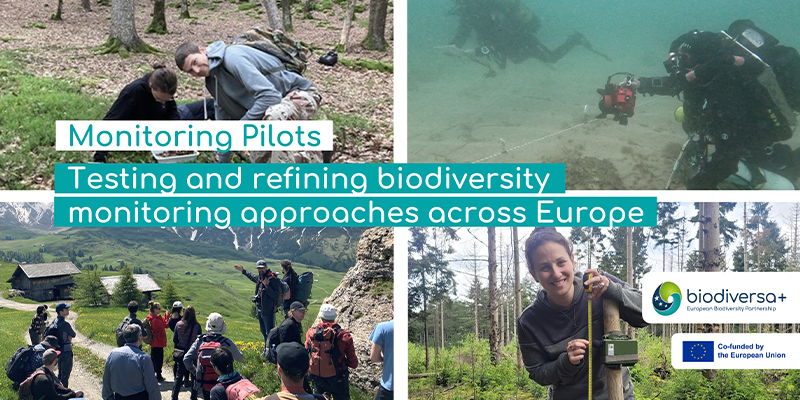Biodiversa+ launches pilot projects as a way to test and refine biodiversity monitoring approaches across Europe. These pilots are carried out by Biodiversa+ partners, sometimes with additional support from external contributors, and contribute to a more unified European monitoring scheme in several ways:
- Standardisation: The pilots test common protocols or combinations of existing protocols, aiming at consistency between national schemes.
- Technological innovation: New technologies are evaluated to see if they can improve the efficiency and effectiveness of monitoring.
- Governance collaboration: Pilots explore ways to bridge different national monitoring governance structures.
- Data availability increase: By testing new approaches, pilots contribute to a richer pool of biodiversity data across Europe, both in terms of timeframes and geographical coverage
Importantly, Biodiversa+ pilots are not research projects but rather an implementation effort led by national organisations responsible for monitoring programs. Once pilots successfully test new approaches, Biodiversa+ will leverage these learnings to build transnational networks of national biodiversity monitoring schemes.
First wave Pilots
Launched in January 2023, the first wave of pilots focused on governance, invasive alien species (IAS), and soil biodiversity. Here’s a quick update on their progress:
- Governance: The pilot concluded after one year. The final report outlines recommendations for establishing a smooth-running, cross-border biodiversity monitoring network.
- IAS: The pilot has published a mid-term report, detailing progress in tackling invasive alien species. Field work has begun, with some partners testing innovative monitoring methods like surveying from boats and trains.
- Soil: The pilot also published a mid-term report, showcasing the project’s progress. The team also presented the initial findings at the World Biodiversity Forum in Davos, Switzerland!
New Pilots launched in 2024
Biodiversa+ is keeping the momentum going with three exciting new pilot projects:
- Automated Biodiversity Monitoring Stations (ABMS): This pilot focuses on developing automated monitoring for nocturnal insects, birds and bats. With sites chosen across 12 countries in diverse habitats, partners are now deploying sensors and insect traps in the field for efficient data collection.
- EuRockFish: This pilot aims to standardise monitoring methods for rocky reef fish communities. A successful workshop in Marseille in May brought together experts to share experiences and establish common protocols for three key monitoring methods: visual underwater census, baited remote underwater video, and metabarcoding on eDNA. The pilot is gearing up for field work starting in July-August.
- Habitat: Focused on using remote sensing technology for habitat mapping and monitoring, this pilot kicked off with a review of existing methods used by partner countries. This review work covers over 40 methods and mapping approaches, colleting information on, for example, data sources, spatial cover, efficiency, and capacity for upscaling. A productive workshop held in Bolzano, Italy, in early June facilitated knowledge exchange and planning for the next stages of the project. These include developing protocols for habitat mapping and quality monitoring.
These pilot projects are paving the way for more effective and collaborative biodiversity monitoring across Europe. Visit their dedicated page for more and stay tuned for further updates on their progress!




